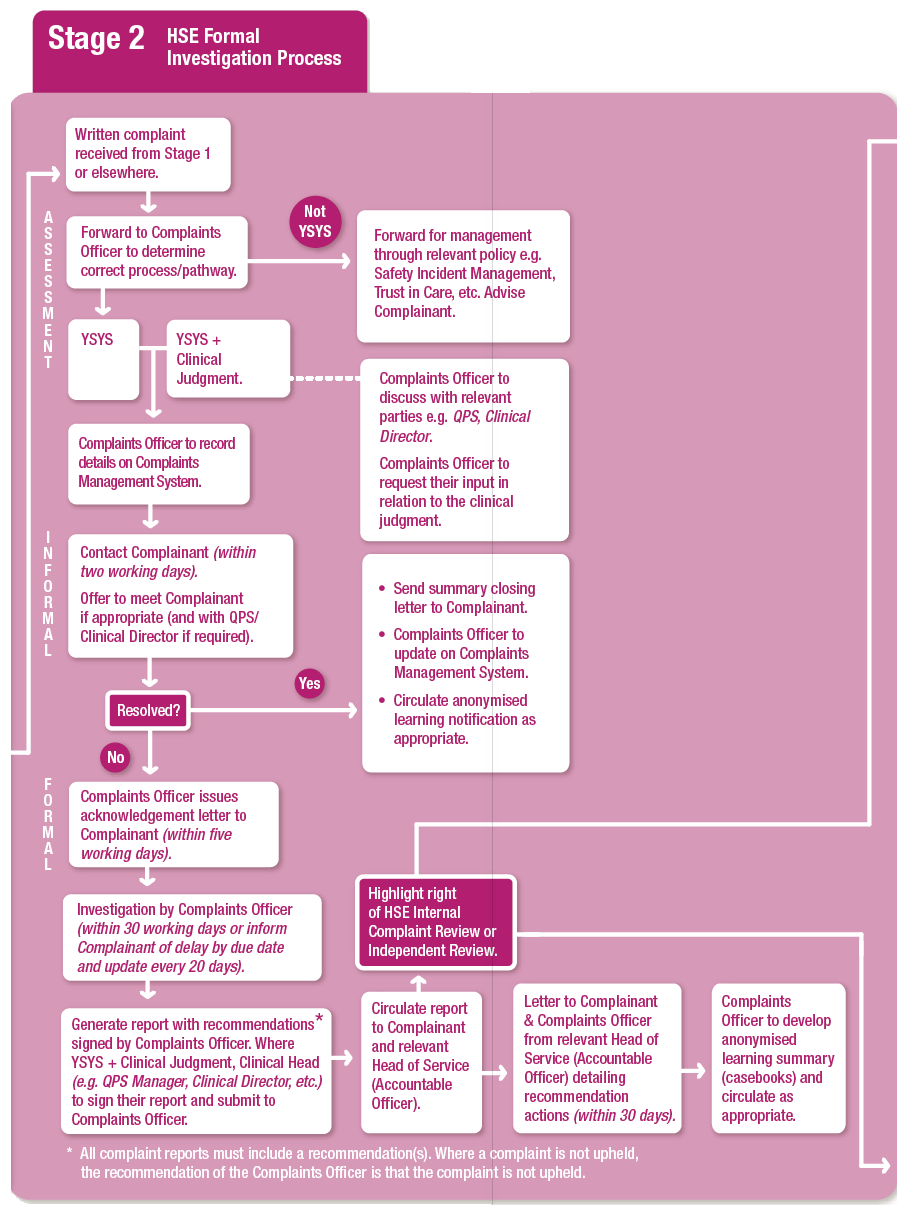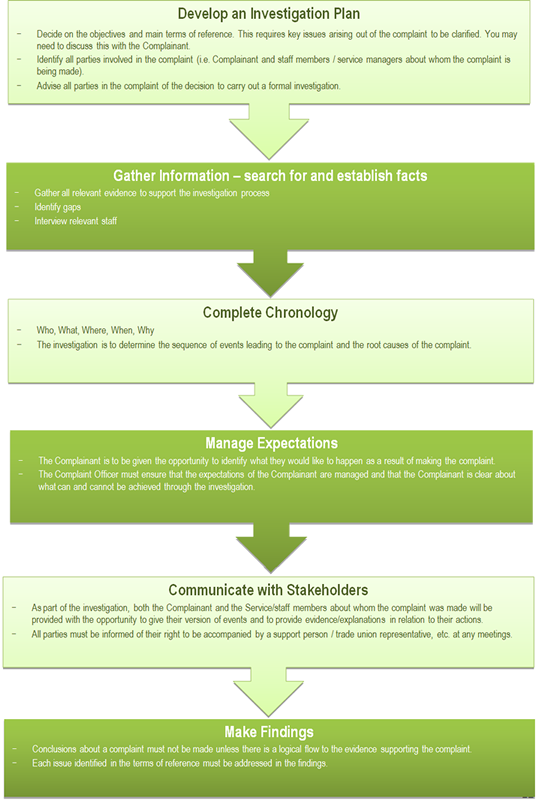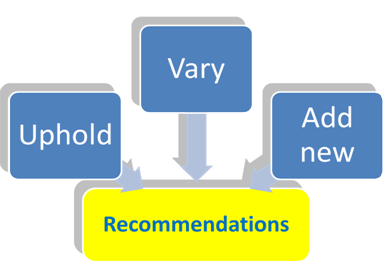If a matter remains unresolved after meeting with the Complainant (s) the process moves to a formal investigation.
The Review Officer shall determine the procedures to be followed in conducting a review. However, the Review Officer must ensure that the procedures are fair and meet with two overarching constitutional principles, i.e. the right to be heard and avoidance of bias.
The Review Officer(s) appointed may request all documentation relevant to the complaint and communicate with any person that he/she reasonably believes can assist with the review of the complaint.
A Complainant who has requested a review may make written representations in support of his or her complaint and such representations will be considered by the Review Officer.
The Review Officer(s) must endeavour to conduct and conclude the review within 20 working days of the request being received. However, where the review cannot be concluded within this timeframe, the Review Officer must inform the Complainant of this fact and indicate the additional time necessary to complete the review. Review Letter Pack (Word Document, 280 KB, 47 pages)
Upon conclusion of a review the Review Officer shall prepare a signed and dated report on the review. A Review Officer will not make a finding in his/her report, adverse to a person, without first having afforded the person concerned with the opportunity to consider the finding or criticism and to make representations in relation to it.
The Review Officer is responsible for carrying out the formal review investigation of the complaint at Stage 3 and may draw on appropriate expertise, skills, etc., as required.
The following process must be adhered to:
1. Acknowledge the Formal Review
The acknowledgement letter must be sent to the Complainant within 5 working days of receipt of the complaint.
When acknowledging a formal review:
- Acknowledge the receipt of the review, acknowledging the date it was written and informing the Complainant of the date it was received.
- There is a ‘No Wrong Door’ approach for feedback within the HSE. Therefore, the date a formal review is received in the HSE marks the commencement of the legislative timeframes, for example, the review must be acknowledged within 5 working days of receipt.
The standard Acknowledgement Template Letter must be used and personalised as appropriate.
Letters personally signed by staff are received better than letters electronically signed or signed by support staff on behalf of somebody.
Remember: Include your work contact details
2. Conduct the Review Investigation
3. Investigate the Complaint
The Review Officer will initiate the investigation of the complaint once all steps have been taken to remove or treat any immediate harm caused by the action about which the complaint is being made.
- The review investigation will be carried out by the Review Officer who will liaise with all relevant parties as required.
- A Review Officer may request any documents and communicate with any persons he or she believes can assist with the investigation of the complaint.
- The Review Officer may also request further information about the complaint from the Complainant to enable a full and proper investigation of the complaint.
- In addition, a Complainant may make written representations in support of his/her complaint review and such representations will be considered by the Review Officer.
- In exceptional circumstances the Review Officer may establish and lead an investigation team, consisting of all relevant persons and staff with expertise and knowledge to carry out the investigation. The size and membership of this investigation team will be dependent on each complaint and will be determined by the Review Officer.
- All information obtained by the Review Officer (and investigation team where appropriate) in the course of investigating a complaint will be deemed to be confidential information and he or she may not discuss, communicate or disclose it except where necessary for the proper investigation of the complaint. (Health Act 2004 (Complaints) Regulations 2006).
- Where the complaint review highlights that the complaint or part of the complaint indicates an employee related issue then this issue is referred by the Review Officer to the Accountable Officer for appropriate action (in conjunction with designated personnel in the Human Resources Department) under the relevant processes.(Table 3: Complaints that cannot be managed using Part 9 of the Health Act 2004)
All staff have an obligation to participate and support the investigation of any complaint where requested
Best practice governing the investigation process

Figure 5: The Steps – Investigation (view in word)

4. Develop recommendations
The Review Officer will decide on any recommendations to be made as a result of the findings of the investigation.
The Review report will outline if the recommendations from the investigation are being upheld, if the recommendations are being varied or the report will detail new recommendations made by the Review Officer. The reason for the decision of the Review Officer will be provided in the report.

These recommendations to include:
- action(s) to be taken to remove the causes of the complaint or its likelihood for re-occurrence as far as is reasonably possible where deemed necessary by the review.
- redress for the Complainant where deemed appropriate by the review
A Review Officer may not, following the investigation of a complaint, make a recommendation the implementation of which would require or cause:
- the Executive to make a material amendment to its approved service plan, or
- a service provider and the Executive to make a material amendment to an arrangement under section 38 of the Health Act 2004.
A Review Officer may not make a finding or insert a comment on his/her report, adverse to a person, without first having afforded the person concerned the opportunity to consider the finding or criticism and to make representations in relation to it.
5. Write Review Report
The final review report should include
- Title page
- Summary of the complaint - background / a description of complaint
- Identify what questions the Complainant wants answered.
- A summary of the decision / recommendations issued by the Complaint Officer
- The Review – an explanation of review officer assignment
- The Review Process - a description of the investigation process including:
- sources of information; the personnel involved in the investigation; the investigation process to assure the Complainant that their complaint has been fully and fairly investigated.
- Chronology of Events (where necessary)
- Findings
- Outline the findings of your investigation / give a summary of the outcome of the investigation.
- Address each item of concern clearly - if a Complainant asks specific questions, where possible answer each individually.
- An apology if there were any delays in the investigation.
- Recommendations (uphold, vary, new)
- Appendices
The cover letter (link) that must be attached to the report going to the Complainant and must outline their right to seek further independent review (Office of Ombudsman/Ombudsman for Children Office or other professional or regulatory bodies).
The recipients of the final report will be invited to contact the Review Officer to clarify any issues in the report.
The Review Officer may need to consider anonymising parts of the report to protect the identity of the Complainant or the staff member when appropriate.
The Review Officer must use the approved template report……link
Upon conclusion of a review, the Review Officer will, as soon as is practicable forward a signed report on the review to the Complainant, the Complaints Officer who investigated the complaint and the Head of Service (Accountable Officer) as appropriate.
Where a staff member against whom a complaint has been made is unhappy with the finding/recommendations against them, they may evoke the Grievance & Disciplinary procedures with their line manager. (link)
6. Implementation of Recommendations made by Review Officers
- Within 30 working days the Accountable Officer will write to the Complainant and the Review Officer detailing recommendation.
- Where a recommendation, the implementation of which would require or cause the Executive to make a material amendment to its approved service plan, the relevant Head of Service (Accountable Officer) may amend or reject the recommendation.
- Where the recommendation is being amended or rejected or where alternative measures are being taken, the relevant Head of Service (Accountable Officer) must give the reasons for their decisions.
- The relevant Head of Service (Accountable Officer) must put an action plan in place for the implementation of the recommendations of the investigation. The action plan, persons responsible and timeframes are to be identified and recorded.
- Where a Complainant has requested a review of the outcome of the investigation, the relevant Head of Service (Accountable Officer) will suspend the implementation of a recommendation and will notify the Complainant of this suspension.
- If after a period of time recommendations made are not implemented and the Complainant is dissatisfied, they should be advised to contact the relevant Hospital Group Chief Executive Officer / Community Healthcare Organisation Chief Officer.
8. Recording
At every stage of the process the Complaints Management System (CMS) must be updated, to include:
- Details of Complainant
- Summary of complaint
- Details of acknowledgement
- Delay letters sent
- Terms of Reference (Individual issues)
- Complaint categories
- Final complaint report
- Recommendations
Sensitive personal data such as clinical information must not be uploaded onto this system, due to Data Protection requirements.
All interactions with the Complainant about their complaint should be recorded.
Any complaint addressed by a Complaints Officer regardless of whether it is informally or formally resolved must be recorded on the Complaints Management System (CMS)
Manual files should be kept in a separate complaints file, treated in the strictest confidence and stored in a secure environment.
Link to: Training: http://www.hse.ie/eng/about/QAVD/Complaints/ncglt/Toolkit/DP/Confidentiality:……
All Review Officers and designated support staff must attend Complaints Management System training!